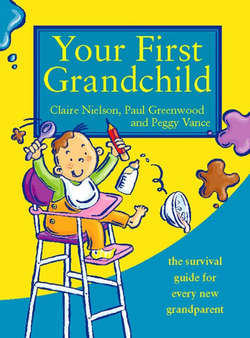Читать книгу Your First Grandchild: Useful, touching and hilarious guide for first-time grandparents - Paul Greenwood - Страница 5
Introduction
ОглавлениеHow did this book come to be written? I suppose it was the result of a rare lunch I enjoyed with my daughter about a year ago. I say rare because, since she became a mother, the number of times we have been able to lunch alone together can be counted on one finger. Anyway, during our meal we were discussing (and laughing about) our unusual family, when it dawned on us that it might not be all that unusual – that, in fact, it is fairly representative of late 20th-century trends.
We seem to cover all possible modern scenarios. I am a grandmother, divorced from my first husband (now deceased) and remarried to a second husband, Paul, who is therefore a stepgrandfather. Paul is also divorced, with one daughter from an early relationship, one adopted daughter from his first marriage, and one stepdaughter, Peggy, from his second marriage to me. Complicated, isn’t it?
I shall never forget the devastating moment when I told Peggy that I had fallen in love with Paul and that he was coming to live with us. She looked at me with all the world-weariness of 12 years spent with a mad actress mother and said, ‘You know, Mum, sometimes I wonder if I can take much more of you.’ Luckily for me and for Paul, she could and did!
Peggy is married to a British-born Sikh, Dharminder, so we have mixed-race grandchildren. Our grandson, Sky, is four years old, and our granddaughter, Biba, is two. Peggy and Dharminder both work, so although Peggy is based at home, she has help with the children. Paul and I are actors – writing, directing and teaching as well – so we also work full-time and, typically for modern grandparents, don’t live around the corner from our grandchildren, but a two-hour drive away: Peggy and Dharminder are in London while we are near Stratford-on-Avon. The children’s paternal grandmother, a widow, also lives two hours away from them, in Leicester.
So there you have it. As people who might be described as ‘modern’ grandparents, we decided to try to write an up-to-the-minute account of how our new role has changed and enriched our lives and, indeed, how we manage to juggle our various commitments.
That was how the idea began. After that, as word spread about the book, so many people made contact and expressed an interest that we realized that the book might become more than just a personal account. Potentially, it could also reflect the views and experiences of many other families – both nuclear and fragmented as our own. When my husband and I travelled to the United States on tour with Henry VIII (now there’s a complicated family man for you!) all kinds of American family experiences were recounted to us too.
I have been constantly delighted by people’s enthusiastic reaction to our subject. Far from having to coax information and opinions out of them, grandparents, parents and grandchildren alike have been delighted to share experiences and pour out confidences. So much so that, in the end, I found I had amassed enough material for several novels!
There seems to be a widespread resurgence of interest in the whole question of grandparenting. After a partial eclipse, the importance of the relationship is assuming its rightful place in the general consciousness. Recently, the novelist and grandparent Alice Thomas Ellis wrote (in The Times, 26th September 1998):
Social engineering has interfered with natural processes and often grandma lives far from the family and cannot assist on a daily basis. A surprising number of young women seem to regret this. Having grown out of the rebellious teenage stage they find they want their mothers … New man has not quite lived up to expectations …
This article was written in response to a new theory of evolution, hot from Dr Kristen Hawks of the University of Utah, which asserts that man’s biological success in becoming a larger-brained species was entirely thanks to grandparents:
Grannies were able to forage for roots and vegetables which they could give to their daughters when they were having babies, creating a well-nourished, thriving third generation … Grannies became so important that the menopause evolved to stop them having children of their own late in life.
Apparently, we are the only species in which the female has a menopause, which allows her to become a good, foraging granny! Well, we may no longer be in charge of grubbing for roots and vegetables, but there are still many other ways in which grannies, and grandfathers too, can help – as we have tried to suggest in this book – to create a thriving third generation.
We hope you get as much fun and pleasure from being grandparents as we do.
